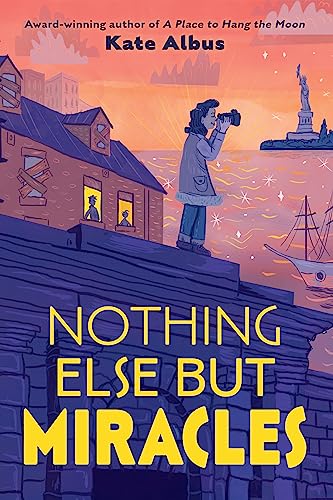Nothing Else But Miracles
When twelve-year-old Dory’s father goes off to fight the Nazis, her brother, Fish, is left in charge of her and their younger brother, Pike. Problem is, Fish is only seventeen. But it’s like Pop said, “The neighborhood will give you what you need.” It’s true. Their neighbors know the score and look out for the Byrne kids, even their kind landlord and Mr. Caputo, who serves them dinner every Thursday night. At one Thursday night dinner, Dory learns that the top floors above Mr. Caputo’s restaurant were sealed off years ago and are accessible only through a rickety old dumbwaiter. All is well until their kind landlord dies and the new, not-kind-at-all landlord figures out Fish is not legally old enough to care for Dory and Pike. Fearing they will be sent to an orphanage, Dory concocts a plan—to live in the abandoned rooms above Mr. Caputo’s restaurant.
Nothing Else But Miracles is as heartwarming as it is heartbreaking. Albus’s masterful use of setting grounds middle-grade readers in time and place regardless of any familiarity, or lack thereof, with New York’s Lower East Side during World War II. Dory is a spunky character who straddles the line between girlhood and adolescence in familiar and funny ways. She gets into trouble at school, hates to wear dresses, prefers to use the fire escape instead of the interior stairs to her apartment, confides her worries to Lady Liberty— “Libby”—and has a budding crush on Vincent Morello. Her relationships with Fish and Pike are fraught with tenderness and tension, which many readers will recognize. An occasionally intrusive narrator adds depth to the characters as well as suspense to the story. Albus presents the tragedies of war delicately but honestly. Highly recommended for all readers, especially those interested in World War II.










